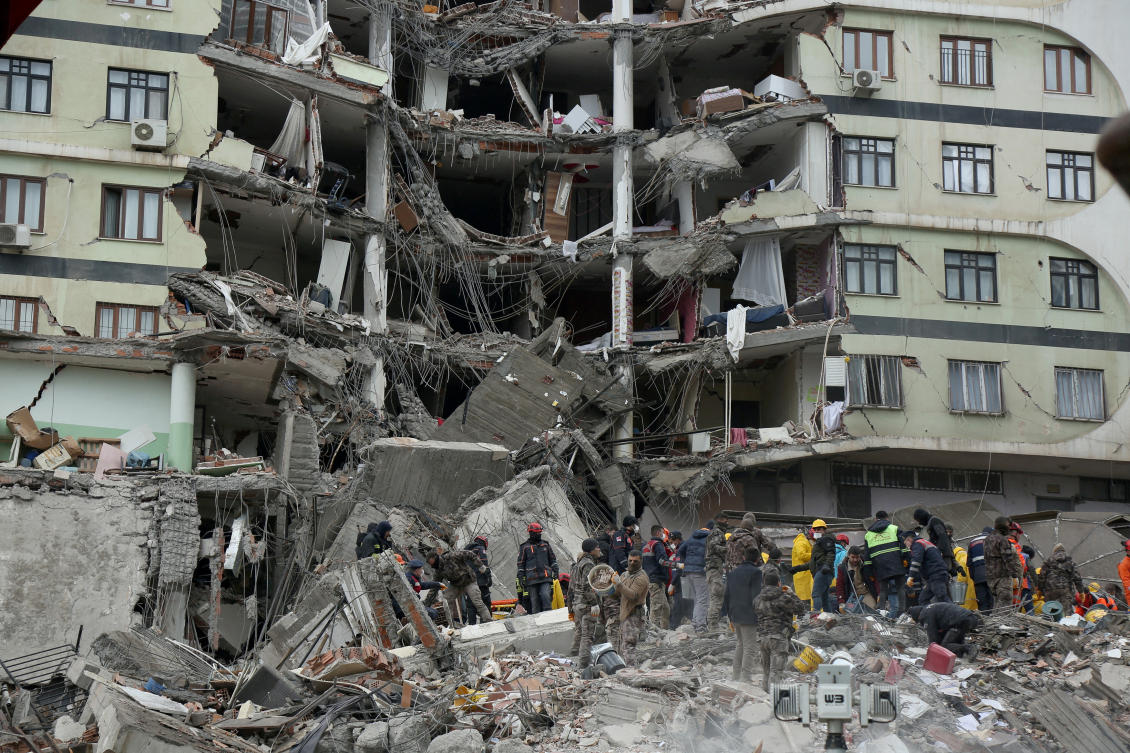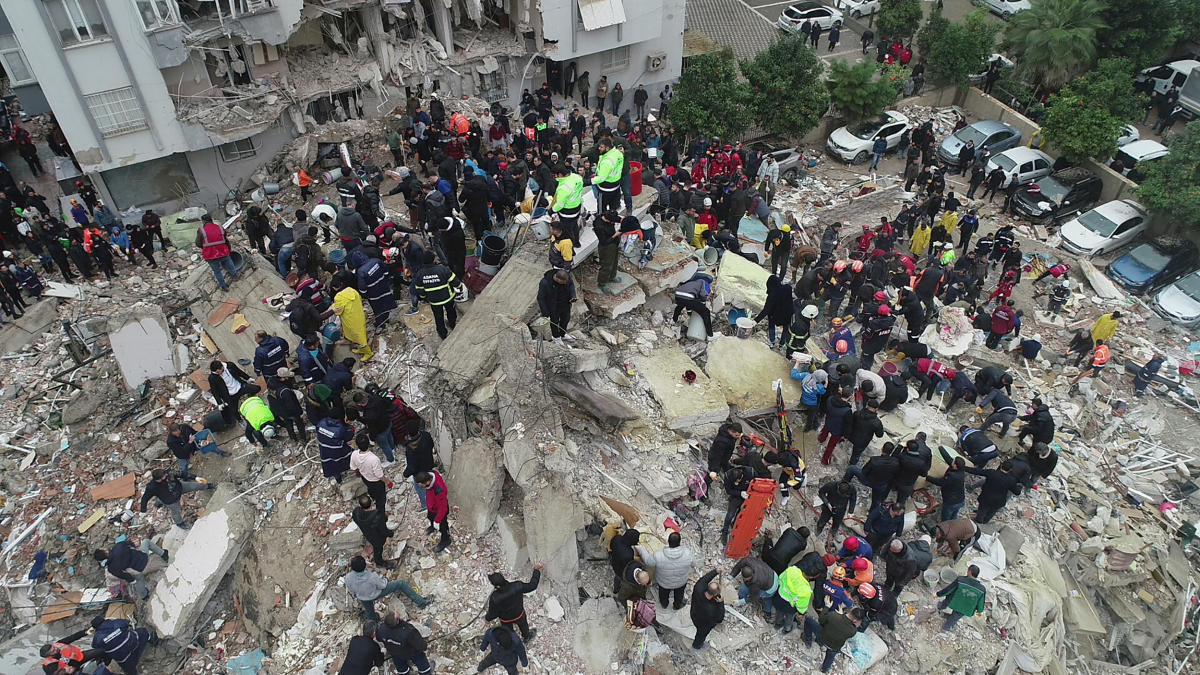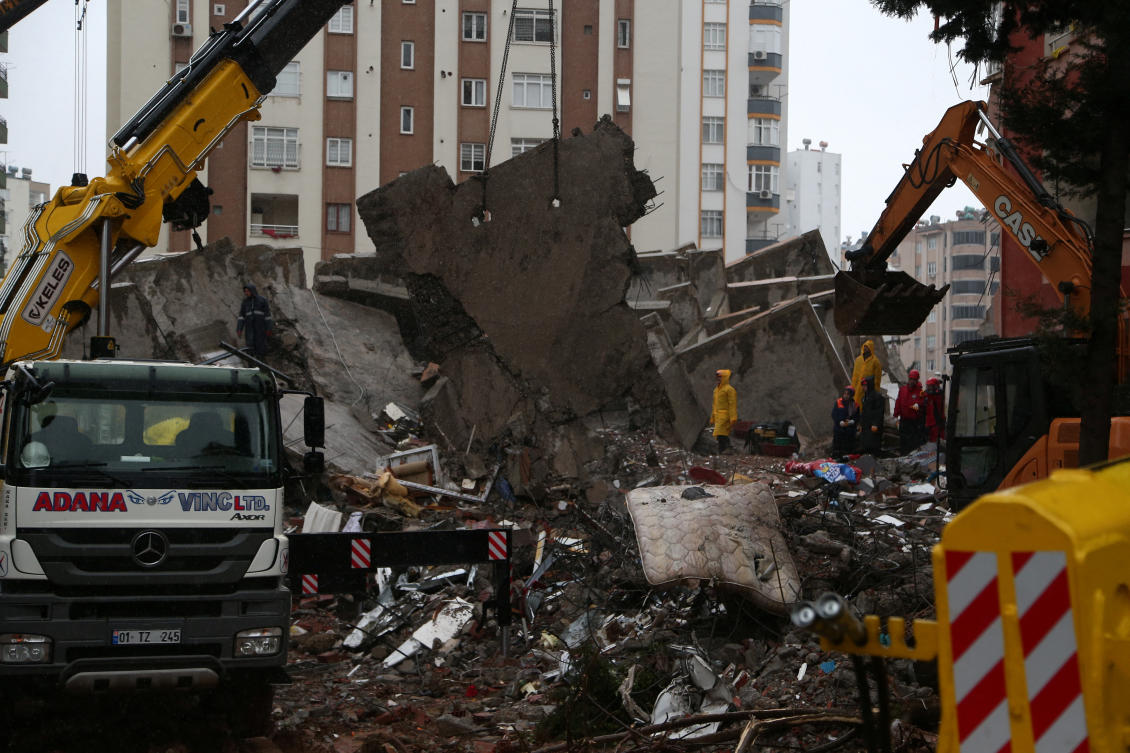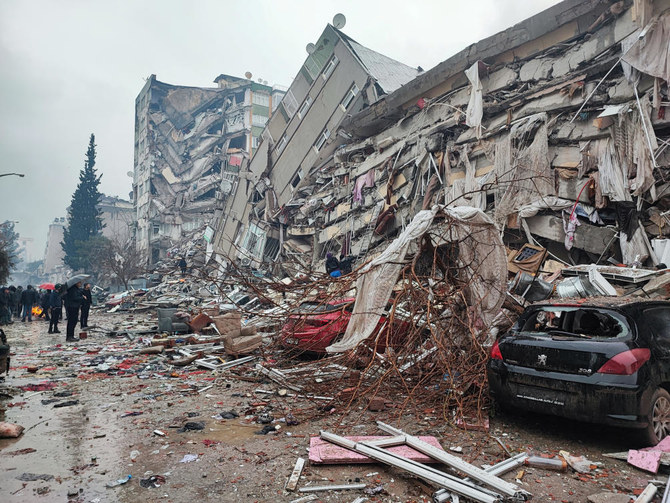ANKARA:Turkish survivors of one of the Middle East’s most devastating earthquakes in decades have relayed their harrowing experiences of surviving the disaster, which left buildings “folding like paper towels.”
Berjin and her cousin Rojhat, who were holidaying in Turkiye’s southeastern province of Diyarbakir, were about to return to their hometown, Van, in the country’s east, before the quake struck.
But early on Monday, the shockwave destroyed the building where Rojhat, a local football player, was sleeping. After emergency services arrived to rescue people from the rubble, Berjin waited for hours in front of the collapsed building in a distraught state.
After Rojhat was rescued, the two returned to Van, where an aftershock struck later in the day. “Please stop, it is such a strong quake, please stop,” Berjin cried in a video capturing lights and furniture shaking in her home.
Berjin, interviewed by Arab News, was was left waiting outside her destroyed home in minus 15 degrees Celsius temperatures after the second quake. The building was one of many in the city that had yet to be renovated following a 2011 earthquake, which killed hundreds of people.

Rescue workers search for survivors under the rubble following an earthquake in Diyarbakir, Turkey February 6, 2023. (Reuters)
Turkiye began the new week with a devastating and deadly 7.8-magnitude earthquake — one of the most powerful to hit the region in decades — killing more than 1,500 people in the country and in neighhboring Syria. About 3,000 buildings were destroyed.
The quake struck just after 4 a.m. Monday morning local time, 23 km east of Nurdagi, Gaziantep province, at a depth of 24.1 km, according to data from the US Geological Survey.
The earthquake also devastated parts of Syria, claiming hundreds of lives in the country. Lebanon, Jordan, Israel and Egypt were also affected.
There was another 7.5-magnitude earthquake at noon on Monday, with the epicenter recorded near Turkiye’s southeastern Kahramanmaras province.
A hospital in southeastern Sanliurfa province was completely destroyed by the earthquake, with many patients left trapped under rubble.
Turkiye stopped oil flow to the southern Ceyhan export terminal as a precaution.

People search through rubble following an earthquake in Adana, Turkey February 6, 2023. (Reuters)
Ozcan Karakoc, a teacher at a state-run school in Diyarbakir, immediately ran to his school building once he felt the quake.
He was involved in assisting survivors next to the school, providing blankets and food to those rescued from nearby buildings.
The school is in Baglar district, one of the most-affected areas in Diyarbakir and also one of the poorest.
“I live in Seyrantepe district of Diyarbakir where buildings were relatively new and we didn’t have so much damage inside the houses. But the building next to our school was about an eight-story old building where more than 200 people were living. It folded like a paper tower in seconds,” Karakoc told Arab News.
He now anxiously awaits news from his students, with many living in run-down housing in Baglar.
After the quakes, the streets of Diyarbakir filled with people, including children, dressed in pajamas in the freezing weather.

Rescuers work at the site of a collapsed building following an earthquake in Adana, Turkey February 6, 2023. (Reuters)
Berrak Demirel, another resident in Diyarbakir, was sleeping when the earthquake struck the city.
She ran out of her home with her husband and children when the second quake ended.
“We stayed long hours outside, but had to come back home due to the freezing weather conditions in the city,” she told Arab News.
Turkish armed forces set up an air aid corridor in the earthquake zone.
Misel Uyar, a resident of Iskenderun, a town in southern Hatay provice, said that a hospital in the area was destroyed in the quake, with health workers and patients inside.
Several new buildings collapsed despite having supposedly been built to modern standards, he added.
Iskenderun port was also damaged during the quake.
“It was the strongest earthquake I’ve ever experienced,” Uyar told Arab News, adding that many of the town’s older buildings were destroyed in the quake.
“Another old building, just some meters away from my house, also collapsed, with several people dying inside.
“All our churches in the region were completely destroyed. The policeman guarding the Orthodox Church died as well because of a stone hitting his body. People took shelter in cars due to the fear of the aftershocks,” said Uyar.
Main opposition Republican People’s Party deputy Ali Oztunc, from Kahramanmaras province, was present in the quake zone during an interview with Arab News.
“All our local municipalities and AFAD, the disaster agency, are currently collaborating to rescue people and provide them with urgent needs,” he said.
“The 500-year-old unbreakable East Anatolian Fault passes beneath this city. We had urged the authorities several times in the past to take necessary precautions regarding the buildings.”
The need to build quake-resilient cities has been a top agenda in Turkiye for years, with prominent scientists warning authorities to take urgent measures.
About 18,000 people in Turkiye were killed in 1999 in a 7.4 magnitude earthquake that rocked the Marmara region.
Another earthquake that hit the country in 1939 killed about 33,000 people.
Renate Cavdar, a music teacher in southeastern Gaziantep province, was surprised at the severity of the quake.
“It was felt so strongly. Several roads are blocked because they were damaged by the earthquake, and bulldozers have to clear the debris to open the passage,” she told Arab News.
“In Islahiye district, a building where an old relative was living collapsed. We are now trying to reach the area to get information from her,” Cavdar said.
According to the latest reports, several local politicians were killed in the region, which is also home to millions of Syrian refugees.
In the southeastern province of Adiyaman, a municipality building collapsed.
The campuses of some local universities were opened to host survivors.
Niyazi Buluter, a civil society activist for the Roma community in Gaziantep, lost six relatives in the quake, including children.
“I have been informed that some family died as the old building they were residing collapsed in seconds during the quake. Low-income people were residing in this district,” said Buluter.
“Several buildings also collapsed in our area. There were some cracks in our one-story house. But we couldn’t stand during the quake. It was so strong. I have a disabled child; I took him in my arms and ran out of the house quickly. May God protect poor people.”
Volkan Demirel, technical director of Hatayspor football team, appealed for humanitarian assistance in an emotional video posted on social media.
Several countries expressed solidarity with Turkiye after Monday’s earthquake.
“I have been in touch with Turkish officials to relay that we stand ready to provide any and all needed assistance,” White House National Security Adviser Jake Sullivan said on Twitter.
“We will continue to closely monitor the situation in coordination with Turkiye,” he added.
Having declared a level four alert state, Turkiye also requested international help through the Emergency Response Coordination Center, the EU’s civil protection program. In response, 45 countries offered to help in search and rescue efforts.
“We express our solidarity and sympathy to our brothers in Syria and Turkiye following the earthquake,” said Saudi Arabia’s Foreign Ministry.














